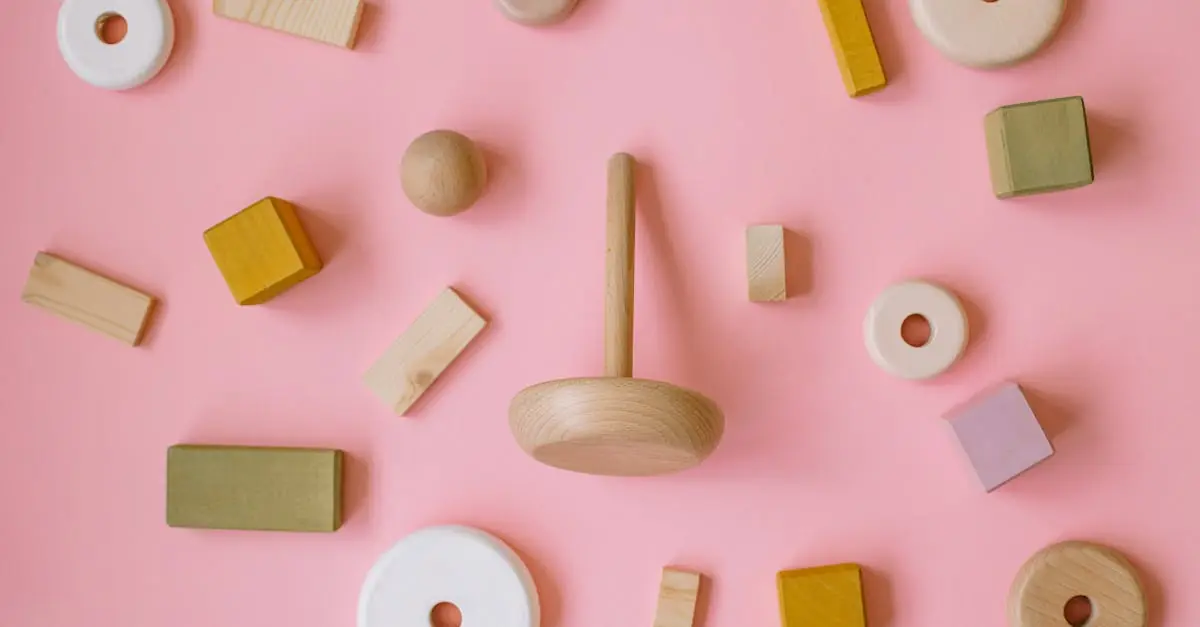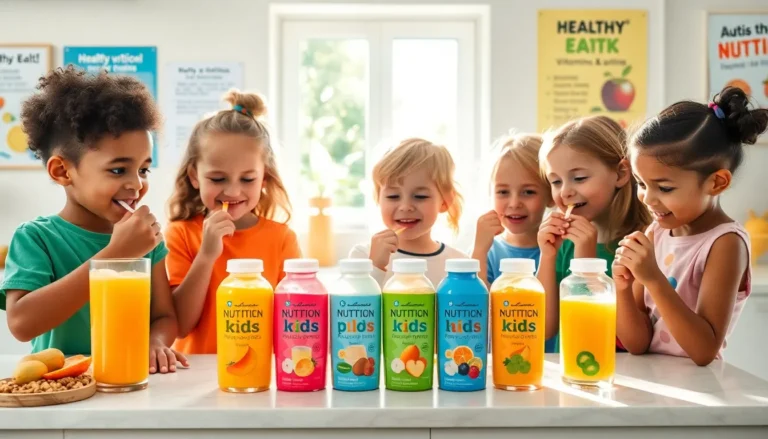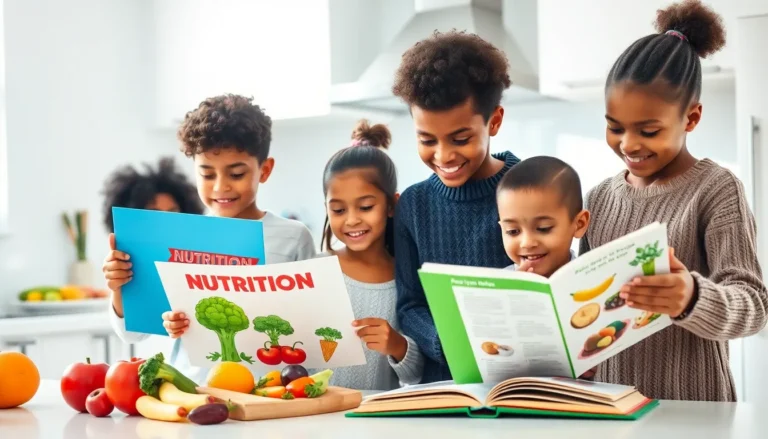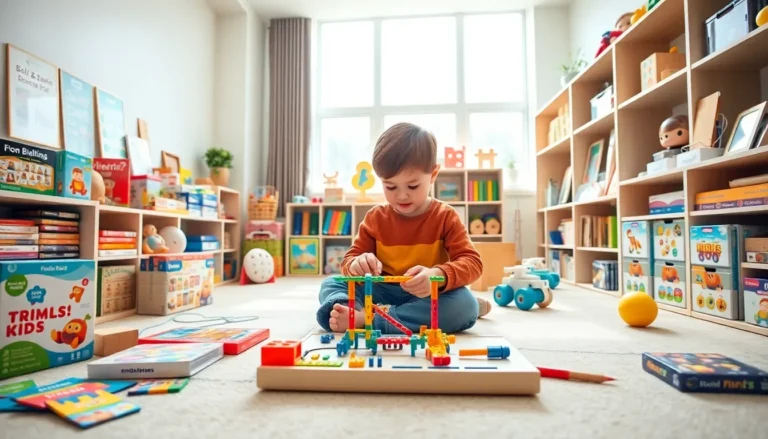When it comes to toddlers, keeping their attention can feel like trying to catch a greased pig. But fear not! The secret weapon lies in the world of educational toys. These magical little wonders not only entertain but also spark creativity and foster learning. Who knew that a colorful block could be the key to unlocking a future genius?
Table of Contents
ToggleTop Educational Toys For Toddlers
Educational toys foster creativity and critical thinking. They also enhance motor skills and cognitive abilities. Here are some top choices:
- Building Blocks
Building blocks promote spatial awareness and problem-solving. Children manipulate various shapes and sizes to create structures.
- Shape Sorters
Shape sorters enhance recognition of shapes and colors. Kids learn to match and fit different pieces into designated slots.
- Musical Instruments
Musical instruments encourage auditory skills and rhythm. Items like xylophones and tambourines allow toddlers to experiment with sound.
- Puzzles
Puzzles support memory and concentration. They involve assembling pieces to form a complete picture, strengthening cognitive development.
- Art Supplies
Art supplies stimulate imagination and fine motor skills. Crayons, markers, and paint enable toddlers to express creativity through various mediums.
- Interactive Books
Interactive books engage reading and comprehension. Features like flaps and textures keep toddlers interested while developing early literacy skills.
- STEM Kits
STEM kits introduce basic science and math concepts. Hands-on experiences with simple experiments captivate young minds and inspire curiosity.
- Play Dough Sets
Play dough sets encourage sensory exploration and hand strength. Molding various shapes boosts creative expression and manipulation skills.
Selecting educational toys tailored to a toddler’s developmental stage enhances engagement and learning. Each toy serves a purpose in fostering essential skills while providing fun.
Benefits Of Educational Toys
Educational toys play a crucial role in toddler development. They provide essential learning opportunities while ensuring children enjoy their playtime.
Cognitive Development
Cognitive skills develop through various activities offered by educational toys. Shape sorters enhance shape recognition, promoting early problem-solving abilities. Puzzles encourage critical thinking, stimulating memory and concentration. Building blocks foster spatial awareness and creative thinking. Interactive books introduce literacy skills, allowing toddlers to engage with stories and concepts. Through these activities, children gain the foundation for advanced learning and exploration.
Motor Skills Enhancement
Motor skills improve significantly with engaging educational toys. Play dough sets stimulate fine motor skills as toddlers knead and mold shapes. Musical instruments promote hand-eye coordination, encouraging rhythm and auditory development. Building blocks require grasping and stacking, enhancing dexterity and strength. These toys facilitate physical engagement through movement, providing toddlers with a well-rounded developmental experience.
Types Of Educational Toys
Educational toys come in various forms, each designed to support different aspects of learning and development for toddlers. Here’s a closer look at some popular types of educational toys.
Building Blocks
Building blocks encourage creativity and spatial awareness in toddlers. These toys allow children to explore geometry by stacking and assembling various shapes. Different sizes and colors of blocks help toddlers learn color recognition while developing fine motor skills. Engaging in block play enhances hand-eye coordination and promotes problem-solving abilities as they figure out how to balance their structures. Parents appreciate the versatile nature of building blocks, allowing for endless creative possibilities.
Musical Instruments
Musical instruments help toddlers develop auditory skills and a sense of rhythm. Simple instruments like maracas, tambourines, and xylophones facilitate sound exploration and promote creative expression. Playing these instruments supports fine motor control as toddlers learn to grasp, shake, and strike various surfaces. Engaging with music also aids in language development and memory enhancement through lyrics and melodies. These instruments foster a love for music while contributing positively to sensory exploration.
Puzzles
Puzzles enhance cognitive development by challenging toddlers to think critically and solve problems. Various shapes and designs target shape recognition and encourage persistence in completing tasks. As children manipulate puzzle pieces, they improve fine motor skills and hand-eye coordination. Engaging with puzzles also supports memory retention as toddlers recall images and colors. Parents often find that puzzles can be an engaging solo activity or a group endeavor, fostering social skills and collaboration.
Criteria For Choosing The Best Toys
Selecting educational toys for toddlers requires careful consideration of various factors. These aspects ensure that the toys contribute positively to development while keeping safety in mind.
Safety Considerations
Safety ranks as a top priority when choosing toys. Toys should contain non-toxic materials to minimize health risks. Additionally, sharp edges or small parts can pose choking hazards, so parents should avoid those. It’s essential to look for toys that meet safety standards set by organizations such as ASTM or EN71. Toys designed for toddlers often include rounded corners and soft textures, which enhance overall safety. Regular inspection for wear and tear also ensures continued safety during playtime.
Age Appropriateness
Age appropriateness significantly influences a toy’s effectiveness in promoting learning. Choosing toys that match a toddler’s developmental stage fosters engagement and skill acquisition. For example, toddlers aged 1-2 benefit from simple shape sorters, while those aged 3-4 find more complex puzzles stimulating. Toys designed for older toddlers often include interactive features that challenge them cognitively and physically. Parents should check manufacturer age recommendations as reliable guides. Aligning toys with a child’s age supports both learning and enjoyment, creating a valuable play experience.
Top Recommended Educational Toys
Educational toys engage toddlers in learning through play. Each toy serves a unique purpose in development.
Toy 1: Building Blocks
Building blocks enhance creativity and spatial awareness. These versatile toys come in various shapes, colors, and sizes. Toddlers manipulate blocks to construct structures, developing fine motor skills in the process. Additionally, building blocks foster problem-solving abilities as they figure out how pieces fit together. When children play with peers, they also learn teamwork and communication, making block play a social experience.
Toy 2: Shape Sorters
Shape sorters promote shape recognition and hand-eye coordination. These toys typically consist of various shapes that fit into corresponding holes. As toddlers attempt to match shapes, they enhance cognitive skills and memory retention. Furthermore, shape sorters encourage independent play, allowing children to learn at their own pace. Choosing an age-appropriate sorter can ensure that the challenge remains manageable yet stimulating for young learners.
Toy 3: Musical Instruments
Musical instruments support auditory skills and fine motor control. Common options include xylophones, shakers, and small keyboards. Engaging with these instruments allows toddlers to explore sounds and rhythm. Playing music also fosters creativity and self-expression, encouraging children to experiment with different melodies. As toddlers move to music, they develop gross motor skills and coordination, introducing a physical aspect to their learning experience.
Choosing the right educational toys for toddlers can significantly impact their development. These toys not only entertain but also cultivate essential skills that lay the groundwork for future learning. By focusing on creativity problem-solving and sensory exploration toddlers can thrive in a stimulating environment.
Parents should prioritize safety and age appropriateness when selecting toys. This ensures that each toy aligns with the child’s developmental stage and maximizes both engagement and educational value. Investing in quality educational toys can lead to enriching playtime experiences that foster growth and development in young children.





